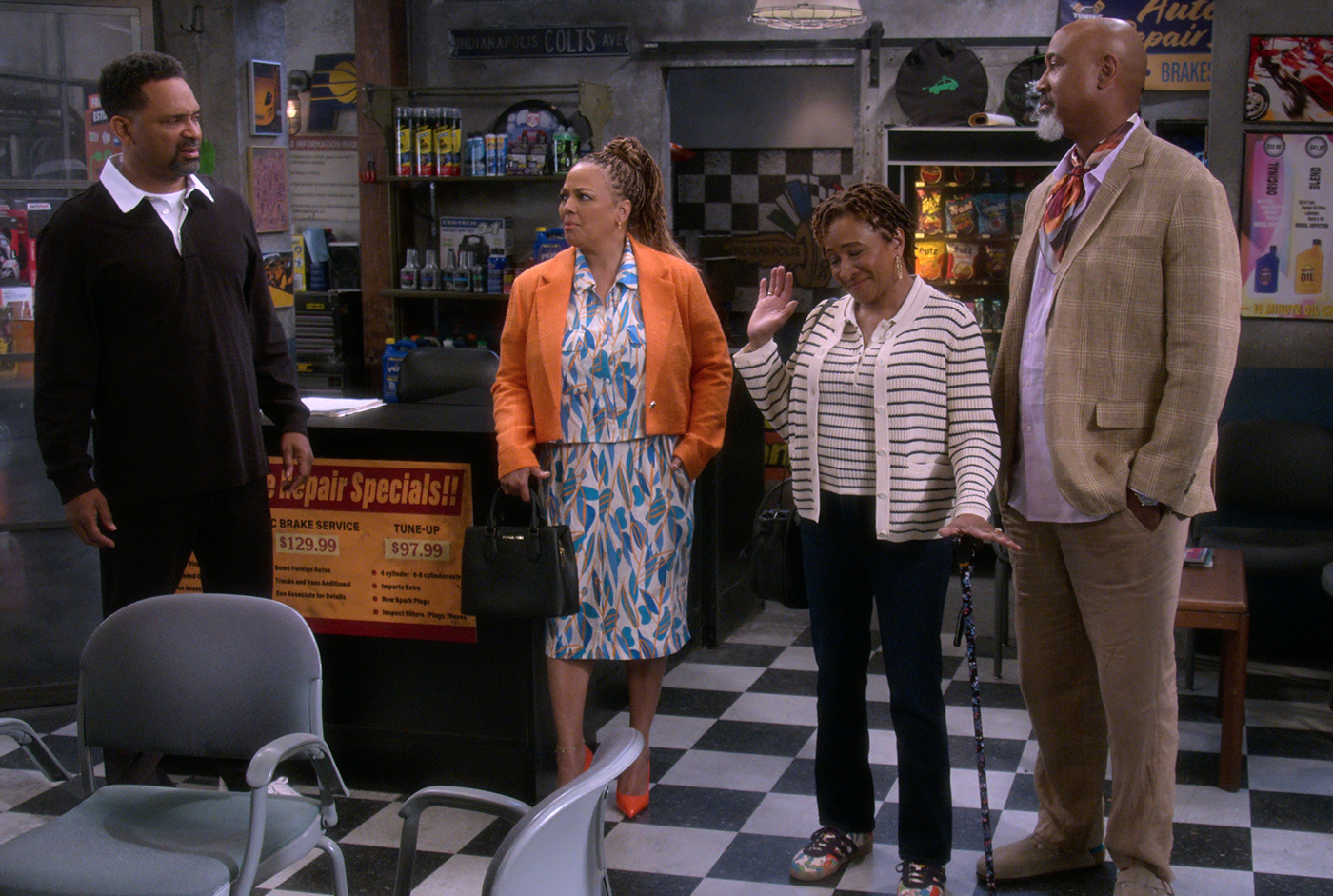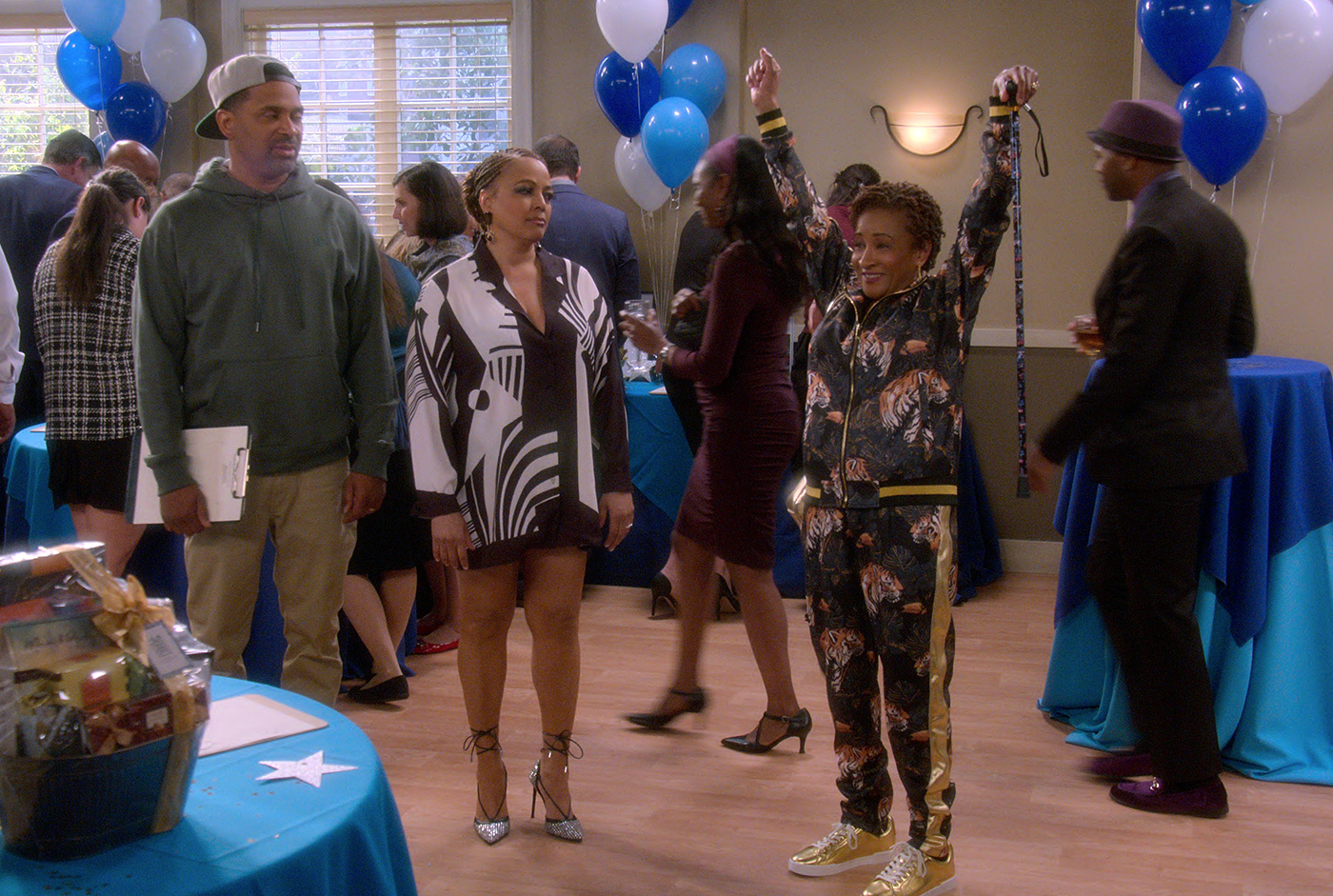AVID ARTIST
ANGEL GAMBOA BRYANT, ACE
“In order for us to work on a multicamera sitcom, Avid is pretty much the only choice.”
EMMY® NOMINATED FOR:
The Upshaws, “Buy Now” and “Grifter, Grifter”
CATEGORY:
Outstanding Picture Editing for a Comedy Series
AVID PRODUCTS USED:
Media Composer
FAVORITE AVID TOOLS:
Animatte, 3D Warp, ScriptSync, Waveforms
The Improv Challenge
Dialogue scenes can be the trickiest because you're limited. There's a scene in "Grifter, Grifter" where we have three characters coming together in a restaurant. It's a simple scene, a few cameras, three people talking, but it's important that we stick to the story and script. Two of the characters, played by Mike Epps and Marsha Warfield, are brilliant improv comedians. They tend to go off script often. That becomes a challenge for me because I have to keep the story, and I can't use a lot of the improv. To cut a scene that's three people talking at a table, you're very limited. There's not much to cut to. It would be cheating if I kept cutting to another character while the other person talked to sew together dialogue. I had to find creative ways to use split screens, blow up shots, crop people out, and change the way I'm cutting to get the full story in.
Shaping Tight, Story-Driven Scenes
The way I approach a scene is story first. It isn't this way in every comedy I've worked on. There are some where it's comedy first, and the producers and directors don't necessarily care about the story. I go through every detail of every take and craft my story first. I make sure I have the best performances, the best angles, I've nailed it 100%, and then I move on to my comedy pass. My comedy pass is a whole other thing, where I'm taking out time, punching it up, working on pacing, adding laughs, rhythm, reaction shots.

The cast of The Upshaws
Using Media Composer is essential because there's two of us. Brian (LeCoz, editor) and I are working sometimes in the studio together, but most of the time in different places. We have to work fast and efficiently as a team to get everything crafted within 24 hours. He's working at the same time as I'm working at building my groups. He's script syncing and then feeding scenes to me. I have to cut really fast. Sometimes we're going back and forth. He'll cut scenes, too. Avid is a big tool for us to work in different locations. I haven't seen another NLE (non-linear editor) that handles multiple cameras and multiple channels of audio really well and efficiently. In order for us to work on a multi-camera sitcom, Avid is pretty much the only choice.
Tools I really like in Media Composer: I look at all the waveforms as I'm cutting because of the pacing of comedy. I use 3D Warp to create split screens because I often have to change a character's performance, maybe on the left or the right side of a frame to match the other character's performance who I'm focusing on. I could use either an Animatte or 3D Warp to composite, remove somebody and add them back in the way I need them to look in that scene. I do a lot of audio sound mixing with laughs. I have to create a sound design when we don't have an audience there. I'm layering in laughs, using keyframes and mixing my audio. We use ScriptSync extensively. It's a critical tool, because we're very fast-paced.
How an Emmy Changes the Game
So many elements make The Upshaws special. So much love goes into creating it. The entire cast and crew, when we show up on set, it's a love fest. Everybody walks in, hugs each other, gives high fives. We like creating together and we have fun. I think it comes across in the show. Wanda Sykes, Mike Epps, Kim Fields, the entire cast are all talented, brilliant comedians.

The cast of The Upshaws
This is my sixth nomination for The Upshaws. It was a surprise because I feel like a lot of us, especially me, have imposter syndrome. I don't take it for granted when I get a nomination. This season there were very strong series that were put up. I thought, ‘Well, this is the end of it and that's fine.’ It shows that people really like the show.
Getting an Emmy nomination changes things, professionally and personally. In my personal community, people are constantly saying, ‘She's Emmy-nominated!’ Which is weird for me because I'm an editor. I don't usually get attention. It's a silent art form. People don't usually know who the editor is. In my professional world, it has changed things. I have an agent now. I've gotten bigger shows, more recognition. It's a big career achievement to get an Emmy nomination.
Editing Boot Camp
Since I was a kid I would pick up a camcorder, start shooting and telling stories. I was always writing, creating, doing art. I didn't really realize there was a path to working as an editor until I got to college. I studied broadcasting. The moment I got into the edit bay, it was my calling. I realized that there was a lot of power in creating a story in the edit bay. Scripted or unscripted, you can completely change the effect of the story through editing.
My first editing hero is Walter Murch. One of the first things I did when I moved to L.A. and wanted to get into editing is buy his book and study it every day. I love Maysie Hoy, Paul Hirsch, Dana E. Glauberman and some of the editors nominated now: Tim Good, I watched every episode of The Last of Us. Russell Griffin, he's one of my mentors and he's nominated with me in this category. His work is incredible. I call him all the time and ask, ‘Hey, I have this scene and I'm stuck. How would you approach this?’ And he gives me advice.
I started using Media Composer when I was in college. It was a backwards way to start. I wasn't trained. I got the keys and went into where we were doing post production and started editing. I had no idea what I was doing. I pretty much destroyed a whole TV show because I didn't know how to lock the tracks and threw everything off. All the commercials slid. That was super fun. It got cancelled.
That was my boot camp. Then I learned, ‘Oh, this is a real machine that I need to respect, understand and learn.’ I started going in there two, three times a week for hours on end learning how to cut to the point where my professors were like, ‘You can't keep going in there because other people can't use the facility because you're using it too much.’ I taught myself and loved it.
It's important to stay creatively sharp between projects. I watch shows of the people I admire. In every genre, comedy, drama, action, old shows I haven't seen, and new shows because the way people approach scenes changes over time, and even tools within the Avid are different. You can learn from everything you watch.
I like a lot of things about being an editor. It's creatively fulfilling. Telling a visual story is like painting with pictures, words and adding music. There's elements that evoke emotion. I love the process of layering those things together, painting the picture, and adding words, sound, and music to it. It's a really cool process.
Break out of the Box
You don't realize when you're starting out that you have the ability to take more risks than you do in your career. You don't realize is that all of us as artists get stuck in a box, they want to label you and it's everywhere in the industry. You cut comedy, you're a comedy editor. You cut drama, you're a drama editor. But the reality is a lot of us can do all of it. Take more risks, decide what you truly want to do and go to professional events, to ACE events, to television academy events, meet editors you admire and call them. Hit them up on social media, ask if you can sit with them, have coffee with them, find out how they did what they did, find out how you get into if you want to work in drama, for example, or in feature films or whatever it is. Talk to people doing it, find out how they got in. Everybody's path is different. It's helpful to understand, get advice and mentorship from people you admire.
My nephew is currently studying editing at USC. I told him, just like I tell everybody, you need to start using Avid because it's the only way you can really become good at your craft. It's the only way that you can work on the big shows and features that you want to work on. You have to know the software. I would tell every up-and-coming student or people who want to get into editing that they need to learn Avid Media Composer.
About the Editor
Angel Gamboa Bryant, ACE, is a seven-time Emmy and three-time Eddie-nominated television and feature editor with two decades of industry experience. Most recently, she edited the Paramount+ comedy, Poppa’s House, starring Damon Wayans, Damon Wayans Junior, and Essence Atkins. She is also known for the Hulu sketch series History of the World, Part II, starring Mel Brooks, Ike Barinholtz, Wanda Sykes, and Nick Kroll; and the Netflix sitcom, The Upshaws. Angel has an impressive resume editing stand-up comedy specials for some of today’s most acclaimed comedians, including the Netflix specials: Wanda Sykes: Not Normal; Tiffany Haddish: Black Mitzvah; Ms. Pat: Y’all Wanna Hear Something Crazy; and Stand Out: An LGBTQ+ Celebration.
Email Preferences | © 2025 Avid Technology, Inc. | Terms & Legal | Privacy

